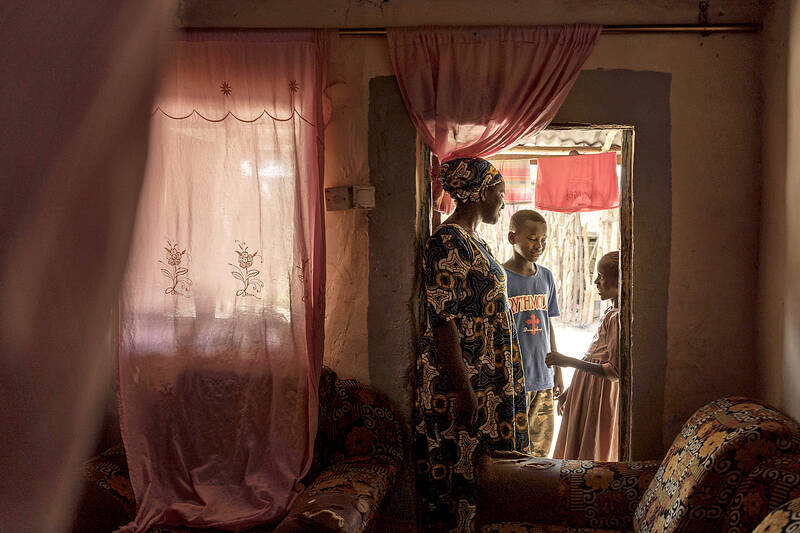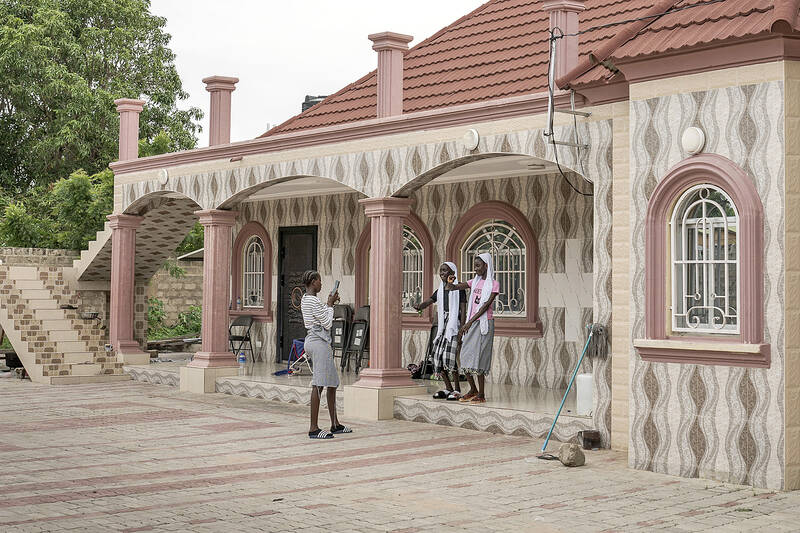Binta Bah met her husband last year on a dating app and instantly fell in love. They spent hours every day glued to their mobile phones and soon got married on a video call.
However, they have met in person only once, when Suleyman Bah returned Gambia for a visit, months after the wedding.
He is one of tens of thousands of West Africans who have undertaken the perilous journey to Europe, and is now working in a factory in Germany.

Photo: AP
Every month he sends money home. He is not alone — Gambians abroad send hundreds of millions of dollars a year in remittances, the World Bank said.
The remittances account for one-fourth of the tiny country’s economy — the highest such proportion on the African continent.
Even as European countries increase their efforts to keep migrants out, Gambians and other West Africans keep risking the dangerous route, known locally as “the backway,” in unsafe boats across the Atlantic Ocean — or they trek hundreds of kilometers across the Sahara Desert before crossing the Mediterranean Sea.

Photo: AP
Almost 10 percent of Gambia’s population of 2.7 million has left the country, most of them young men from rural areas. The money they send is an economic lifeline for their families, but their absence weighs heavily on their communities.
“It’s difficult to be apart,” the 24-year-old Binta Bah said of her long-distance marriage. “But it’s good when the other person takes care of you.”
“Whenever I need something, like to see a doctor, he sends the money straight away,” added Bah, who lives with her mother-in-law.

Photo: AP
Life is increasingly difficult in their village of Kwinella, where people for centuries grew rice, maize, millet and peanuts to make a living. However, climate change and outdated farming practices have made their traditional lifestyle unsustainable.
Moustapha Sabally, deputy head of Kiang Central Province, which includes Kwinella, said the rains have become unpredictable for farming, which is still done by hand and without tractors.
Few young men are around to do that work, he said, adding that about 70 percent of them left the province for the capital, Banjul, or for Europe.
That leaves women and older people who struggle with the long and laborious work on the land, forcing the community to depend on remittances, Sabally said.
Without the remittances, “life would be very difficult,” he said.
Gambia, the smallest country on the African mainland, is surrounded by Senegal except for a sliver of the coast where the Gambia River flows into the Atlantic Ocean. According to the World Bank, 75 percent of its population lives in poverty and there is virtually no industry. The economy relies on imports, and living costs have skyrocketed since the COVID-19 pandemic.
Nearly 60 percent of Gambians are younger than 25, and nearly half of them are unemployed. Despite EU efforts in West Africa to reduce the number of migrants, the lack of jobs reinforces the conviction of many that leaving is their only option.
Last year alone, more than 8,000 Gambians arrived in Europe, the International Organization for Migration said.
Many others die trying. Earlier this year, a boat carrying 300 migrants, mostly from Gambia and Senegal, capsized off Mauritania; more than a dozen were killed and at least 150 others went missing. Last year, a young man from Kwinella drowned on his way to Europe.
Because the journey is so risky, most young men slip away for Europe without letting their loved ones know they are leaving.
Musukebbe Manjang’s 39-year-old husband left Kwinella for Italy 10 years ago, after he could no longer make enough money from construction work.
She never encouraged him to leave, “the risk was just too high,” she said.
One evening, when Manjang was pregnant with their third child, her husband’s younger brother called him from Italy, and he simply disappeared without a word. He later called to say he had left for Europe.
Then she heard nothing for nine months, and her anger turned to fear. When he finally arrived in Italy, he called and said that he had been kidnapped in Libya, long a key starting point for many Mediterranean crossings to Europe.
These days, Manjang’s husband sends about 14,000 dalasi (US$204) a month, enough to cover the children’s school fees, food and clothes, she said.
On a personal level, it has been difficult, Manjang said.
“He misses all the important moments,” she said. “He hasn’t even met our youngest daughter.”
Gambia’s central bank says remittances amounted to more than US$730 million last year, but experts say that the rising costs of living would push more men to migrate abroad.
Eliman Jallow, 42, the Gambia-born founder of a UK-based company that facilitates sending money home to Africa, said that his clients are a mix, from highly skilled workers to manual laborers.
The son of Ansumana Sanneh from Kaiaf, a village not far from Kwinella, was a teacher. He left for Europe because he could barely make a living on a teacher’s monthly salary of 5,000 dalassi.
His journey was cut short when he was kidnapped by a Libyan militia and Sanneh paid the equivalent of US$700 in ransom before his son was freed and returned home.
Sanneh believes the dreams of the young village men are fueled by the misguided idea of Europe as a promised land, but with rising costs of living in European countries, migrants today are able to send less money home than in the past, he said.
The gamble is simply not worth the risks, Sanneh said.
However, stories of success and evidence of what remittances can do often outweigh such words of caution — large concrete village homes built with money sent back are solid; images posted on social media by migrants who work in Europe appeal to the young men still in the village.
Despite his ordeal, Sanneh’s son hopes to find a way to leave Gambia again.
Not far from their home, a group of teenagers practiced a dance routine in front of a stylish brick house, its driveway lined with spotless pink tiles.
The teens were recording a video for TikTok, they said, and chose the prettiest — and largest — village house for the background.
The house belongs to a family whose young man migrated to the US, for many, the most coveted migrant destination, they said.

SEEKING CLARITY: Washington should not adopt measures that create uncertainties for ‘existing semiconductor investments,’ TSMC said referring to its US$165 billion in the US Taiwan Semiconductor Manufacturing Co (TSMC, 台積電) told the US that any future tariffs on Taiwanese semiconductors could reduce demand for chips and derail its pledge to increase its investment in Arizona. “New import restrictions could jeopardize current US leadership in the competitive technology industry and create uncertainties for many committed semiconductor capital projects in the US, including TSMC Arizona’s significant investment plan in Phoenix,” the chipmaker wrote in a letter to the US Department of Commerce. TSMC issued the warning in response to a solicitation for comments by the department on a possible tariff on semiconductor imports by US President Donald Trump’s

‘FAILED EXPORT CONTROLS’: Jensen Huang said that Washington should maximize the speed of AI diffusion, because not doing so would give competitors an advantage Nvidia Corp cofounder and chief executive officer Jensen Huang (黃仁勳) yesterday criticized the US government’s restrictions on exports of artificial intelligence (AI) chips to China, saying that the policy was a failure and would only spur China to accelerate AI development. The export controls gave China the spirit, motivation and government support to accelerate AI development, Huang told reporters at the Computex trade show in Taipei. The competition in China is already intense, given its strong software capabilities, extensive technology ecosystems and work efficiency, he said. “All in all, the export controls were a failure. The facts would suggest it,” he said. “The US

The government has launched a three-pronged strategy to attract local and international talent, aiming to position Taiwan as a new global hub following Nvidia Corp’s announcement that it has chosen Taipei as the site of its Taiwan headquarters. Nvidia cofounder and CEO Jensen Huang (黃仁勳) on Monday last week announced during his keynote speech at the Computex trade show in Taipei that the Nvidia Constellation, the company’s planned Taiwan headquarters, would be located in the Beitou-Shilin Technology Park (北投士林科技園區) in Taipei. Huang’s decision to establish a base in Taiwan is “primarily due to Taiwan’s talent pool and its strength in the semiconductor

French President Emmanuel Macron has expressed gratitude to Hon Hai Precision Industry Co (鴻海精密) for its plan to invest approximately 250 million euros (US$278 million) in a joint venture in France focused on the semiconductor and space industries. On his official X account on Tuesday, Macron thanked Hon Hai, also known globally as Foxconn Technology Group (富士康科技集團), for its investment projects announced at Choose France, a flagship economic summit held on Monday to attract foreign investment. In the post, Macron included a GIF displaying the national flag of the Republic of China (Taiwan), as he did for other foreign investors, including China-based